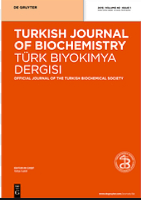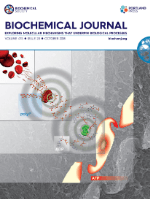
Turkish Journal of Biochemistry-Turk Biyokimya Dergisi
Scope & Guideline
Innovative insights for a thriving biochemical community.
Introduction
Aims and Scopes
- Biochemical Mechanisms in Disease:
The journal focuses on elucidating the biochemical pathways involved in various diseases, including cancer, diabetes, cardiovascular diseases, and autoimmune disorders. This includes studies on biomarkers, metabolic pathways, and molecular interactions that contribute to disease progression. - Translational Research:
A significant aim is to translate biochemical research into clinical applications. This includes the exploration of potential biomarkers for early diagnosis, treatment efficacy, and disease prognosis, particularly in cancer and metabolic disorders. - Innovative Methodologies:
The journal encourages the use of novel methodologies, such as in vitro and in vivo models, advanced imaging techniques, and computational approaches, to investigate biochemical processes and their clinical relevance. - Nutritional Biochemistry:
Research on the biochemical effects of nutrients, dietary components, and supplements on health outcomes is a core area, with a focus on how these factors influence disease mechanisms and treatment responses. - Environmental and Clinical Biochemistry:
The journal also covers studies related to the impact of environmental factors on biochemical processes, as well as the biochemical basis of laboratory diagnostics and the assessment of laboratory practices.
Trending and Emerging
- Biomarkers and Diagnostics:
There is a notable increase in research focused on identifying and validating biomarkers for early disease detection, particularly in cancer and chronic diseases. This trend underscores the importance of non-invasive diagnostics in improving patient outcomes. - COVID-19 Related Research:
Research centered on the biochemical aspects of COVID-19, including its pathophysiology, biomarkers for disease severity, and the effects of treatments, has surged. This reflects the global health crisis and its impact on biochemistry research priorities. - Nutritional Biochemistry and Metabolism:
Emerging studies are increasingly exploring the biochemical impacts of nutrition on health, disease prevention, and management. This encompasses research on dietary supplements, metabolic syndrome, and the role of specific nutrients in chronic diseases. - Cancer Metabolism and Therapeutics:
A growing number of publications are focused on the metabolic pathways of cancer cells and the development of novel therapeutic strategies targeting these pathways. This trend indicates a shift towards understanding cancer not just as a genetic disease but also as a metabolic disorder. - Machine Learning and Bioinformatics Applications:
The incorporation of machine learning and bioinformatics in analyzing biochemical data is becoming more prevalent. This trend reflects the need for advanced analytical techniques to handle complex biological data and improve predictive modeling in biochemistry.
Declining or Waning
- Basic Biochemical Studies:
There appears to be a waning interest in purely basic biochemical studies that do not directly connect to clinical implications or translational research. The journal is increasingly favoring studies with clear practical applications or implications for health. - Traditional Laboratory Techniques:
Papers focusing on traditional laboratory techniques without innovative adaptations or significant clinical relevance have declined. The shift towards automation and advanced diagnostic methods has overshadowed these studies. - Single-Factor Studies:
Research that focuses solely on individual biochemical factors without considering their interactions or broader biological contexts has become less common. The trend is moving towards integrative approaches that consider multiple factors and their interactions. - Solely Theoretical Reviews:
The journal has seen a decrease in the publication of theoretical reviews that do not provide new insights or practical applications. There is a growing preference for reviews that synthesize findings with a clear focus on future research directions or clinical applications.
Similar Journals

Journal of Medical Biochemistry
Unveiling the Biochemical Secrets to Better HealthJournal of Medical Biochemistry is a distinguished peer-reviewed journal published by the SOC MEDICAL BIOCHEMISTS SERBIA, focusing on the significant intersection of biochemistry and medicine. With an e-ISSN of 1452-8266, this Open Access journal has been enriching the academic community since 2007, providing vital insights and research findings that advance the field of medical biochemistry. Based in Belgrade, Serbia, the journal plays a pivotal role in disseminating contemporary research, highlighted by its impressive standings in the 2023 quartile rankings, featuring Q2 in Medical Biochemistry and Q3 in Clinical Biochemistry. The journal is recognized in Scopus with rankings that position it within the discerning area of medical biochemistry and clinical biochemistry, attesting to its influence and relevance. By promoting innovative research and facilitating an open exchange of scientific ideas, the Journal of Medical Biochemistry is a crucial resource for researchers, professionals, and students dedicated to uncovering the biochemical underpinnings essential to improving human health.

AMINO ACIDS
Advancing Biochemical Insights Since 1991AMINO ACIDS is a distinguished journal published by Springer Wien, specializing in the dynamic field of biochemistry, with a particular focus on the role of amino acids in biological processes. Since its inception in 1991, this journal has become a crucial resource for researchers and professionals, contributing valuable insights into the biochemical makeup and clinical applications of amino acids. With a commendable impact factor reflecting its high-quality publications, AMINO ACIDS consistently ranks in the Q2 category across biochemistry and organic chemistry domains as of 2023, demonstrating its significant influence within the scholarly community. The journal is indexed in Scopus and maintains strong rankings—59th in Organic Chemistry and 43rd in Clinical Biochemistry—highlighting its relevance and rigorous peer-review standards. While it currently does not offer open access options, the journal remains dedicated to advancing knowledge in both fundamental and applied biochemistry, making it an essential platform for disseminating cutting-edge research findings. For any academic seeking to explore the complexities of amino acids, AMINO ACIDS serves as an invaluable reference.

Biochemistry Research International
Connecting researchers with cutting-edge findings in biochemistry.Biochemistry Research International is a prominent and dynamic journal published by Hindawi Ltd, dedicated to advancing knowledge in the field of biochemistry. With its Open Access model established since 2010, the journal provides unrestricted access to high-quality research, thereby fostering global communication among researchers and professionals. Operating out of the United States, Biochemistry Research International serves as a vital platform for disseminating cutting-edge findings in biochemistry and molecular biology, holding a respectable Q2 ranking in its category as of 2023. The journal's scope encompasses a wide array of topics including but not limited to biochemical processes, genetic engineering, and molecular interactions, making it an essential resource for students and seasoned researchers alike. With an impact factor reflective of its significance in the academic community, Biochemistry Research International continues to play an integral role in shaping the future of biochemistry research.

FISH PHYSIOLOGY AND BIOCHEMISTRY
Pioneering Research on Fish and Ecosystem DynamicsFISH PHYSIOLOGY AND BIOCHEMISTRY, published by Springer, is a leading journal in the fields of aquatic science, biochemistry, and physiology, with an impressive trajectory since its inception in 1986 and continuing through 2024. Operating from the Netherlands, this journal serves as a vital platform for researchers, professionals, and students alike, showcasing innovative studies that explore the physiological and biochemical aspects of fish, contributing significantly to our understanding of aquatic ecosystems and their inhabitants. With a robust impact factor reflected in its Q1 status in Aquatic Science and notable rankings in other relevant categories, FISH PHYSIOLOGY AND BIOCHEMISTRY maintains a strong scholarly influence, evidenced by its Scopus ranking within the top quartiles of various biological sciences disciplines. While the journal does not currently offer open access options, it remains a cornerstone for advancing knowledge and fostering collaboration within the community dedicated to aquatic biology and related fields.

Biochemistry Moscow-Supplement Series B-Biomedical Chemistry
Empowering Researchers to Transform Biochemical Discoveries into Solutions.Biochemistry Moscow-Supplement Series B-Biomedical Chemistry, published by MAIK NAUKA-INTERPERIODICA, is a pivotal journal in the fields of biochemistry, clinical biochemistry, and molecular medicine. Established in 2008, the journal serves as a vital platform for researchers and professionals seeking to disseminate and access groundbreaking research in the biomedical sciences. With an ISSN of 1990-7508 and an E-ISSN of 1990-7516, the journal has been recognized in the Q4 quartile across various categories as of 2023, highlighting its emerging presence in the academic community despite a competitive landscape. Although currently not available as Open Access, the journal encompasses a broad spectrum of studies, ranging from theoretical analysis to practical applications in biomedical research. The journal's dedicated focus on advancing our understanding of biochemical principles positions it as an essential resource for students and professionals alike, enhancing its significance in the global scientific dialogue.

CELL BIOCHEMISTRY AND FUNCTION
Unraveling Cellular Mysteries Through Innovative ResearchCELL BIOCHEMISTRY AND FUNCTION is a prominent journal dedicated to disseminating high-quality research in the fields of biochemistry, cell biology, and clinical biochemistry. Published by Wiley, this journal has maintained an esteemed reputation since its inception in 1983, bridging decades of scientific advancements and contributions until 2024. With ISSN 0263-6484 and E-ISSN 1099-0844, it serves as a vital resource for researchers, professionals, and students. The journal is classified in quartiles Q2 and Q3 across various categories in the 2023 rankings, showcasing its impact and significance within the academic community. Highlighting essential studies in medicinal biochemistry and cellular functionalities, CELL BIOCHEMISTRY AND FUNCTION not only presents cutting-edge research but also encourages interdisciplinary collaboration, thereby advancing the understanding of biochemical processes that underlie living systems. With no open access currently available, readers are encouraged to access articles through institutional subscriptions or individual purchases, ensuring exclusive engagement with the latest scientific findings in this dynamic field.

MOLECULAR AND CELLULAR BIOCHEMISTRY
Exploring Cellular Processes with PrecisionMOLECULAR AND CELLULAR BIOCHEMISTRY, an esteemed journal published by SPRINGER, serves as a prominent platform in the fields of biochemistry and molecular biology. With a history of dissemination since 1973, this journal has made significant contributions to the understanding of biochemical processes at the molecular level. The MOLECULAR AND CELLULAR BIOCHEMISTRY journal focuses on a myriad of topics including but not limited to cellular biochemistry, clinical biochemistry, and interdisciplinary approaches in medicine, boasting a commendable categorization in the 2023 Scopus ranks where it falls under Q3 in Cell Biology, Q2 in Clinical Biochemistry, Q1 in Medicine (miscellaneous), and Q2 in Molecular Biology. Although the journal is not open access, it provides access options through institutional subscriptions, making valuable research accessible to a wider audience. With its rigorous peer-review process and high impact within the scientific community, this journal aims to advance knowledge and stimulate exploration in biochemical research, making it essential reading for researchers, professionals, and students alike.

BIOCHEMICAL JOURNAL
Championing High-Quality Research in Molecular BiologyBIOCHEMICAL JOURNAL, published by Portland Press Ltd, stands as a leading publication in the fields of Biochemistry, Cell Biology, and Molecular Biology, reflecting a commitment to advancing scientific knowledge since its inception in 1945. With a distinguished Q1 ranking across these categories and impressive Scopus rankings, the journal serves as an invaluable resource for researchers, professionals, and students alike, facilitating critical discoveries and innovative research practices. Although not currently offering open access, the journal provides a platform for high-quality peer-reviewed articles, ensuring rigorous standards in the dissemination of biochemical research. Spanning over seven decades and continuing through to 2024, the BIOCHEMICAL JOURNAL fosters an environment where cutting-edge biochemical research thrives, supporting the global scientific community's efforts to address complex biological questions and enhance our understanding of fundamental cellular processes.

BIOCHEMICAL SOCIETY TRANSACTIONS
Transforming Research into Practical ApplicationsBIOCHEMICAL SOCIETY TRANSACTIONS is a premier journal published by Portland Press Ltd, renowned for its rigorous dissemination of cutting-edge research in the field of biochemistry. Established in 1973 and currently spanning until 2024, this journal has solidified its standing with an impressive Q1 category ranking in Biochemistry, reflecting its commitment to high-quality scholarship and innovation. It plays a crucial role in bridging current biochemical research with its practical applications, making it an invaluable resource for researchers, professionals, and students alike. The journal enjoys a commendable position in the Scopus Ranks, sitting at Rank #105 out of 438 journals in its category, placing it in the 76th percentile among similar publications. While the journal maintains a subscription-only access policy, it promises to provide readers with comprehensive insights and discoveries that drive advancements in biochemistry and related fields. This journal is not just a repository of information; it is a vibrant community dedicated to the progress of biochemistry, making it essential reading for anyone involved in this dynamic discipline.

CRITICAL REVIEWS IN BIOCHEMISTRY AND MOLECULAR BIOLOGY
Connecting Scholars through Rigorous ReviewWelcome to Critical Reviews in Biochemistry and Molecular Biology, a premier academic journal published by Taylor & Francis Ltd, dedicated to advancing the fields of biochemistry and molecular biology. With an impressive impact factor and a Q1 ranking in both Biochemistry and Molecular Biology for 2023, this journal serves as a vital resource for researchers, professionals, and students eager to engage with cutting-edge reviews and analyses that synthesize the latest developments in these dynamic areas of study. Since its inception in 1972, the journal has maintained a commitment to high-quality scholarship, providing a platform for critical discussions that accelerate the discovery and understanding of biochemical processes and molecular interactions. Although not open access, its robust editorial peer-review process ensures that published articles meet the highest standards of scientific rigor, making it a trusted source for the scientific community. As we continue to converge toward 2024, we invite you to explore the extensive array of topics and findings that have shaped contemporary biochemistry and molecular biology.